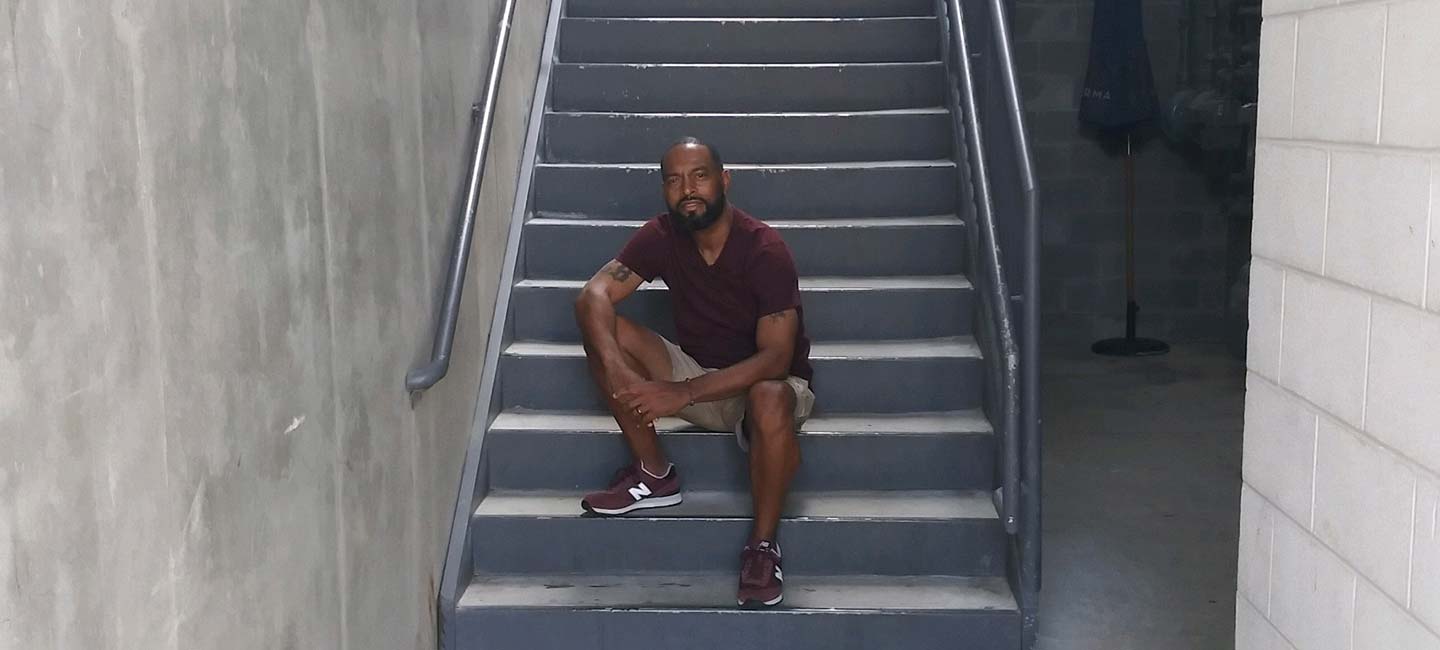Despite Lung Cancer, 'I Am My Son's Superhero'
Assistant pastor Emanuel Standifer, a father and husband of great faith, never would have imagined how a persistent cough would forever change his life.
No one knows him better than his doting wife, Maisha. In January 2020, she noticed he had developed a pesky cough. So, like any good wife, she took it upon herself to get him some cough medicine.
It didn’t work. Even more alarming: Emanuel started complaining about pain but declined to seek medical attention. He thought it would pass.
“Men are more defiant,” Maisha explained. “Gender disparities, societal pressures, tough guy mentality; it all contributes to diagnosis at advanced stages.” At the time, Maisha was a research assistant and graduate student at Moffitt Cancer Center. The couple recently moved to Atlanta, where Maisha is the director of health policy at the Satcher Health Leadership Institute at Morehouse School of Medicine. Her work focuses on racial and ethnic health disparities and men’s health, and it made her even more concerned about her husband.
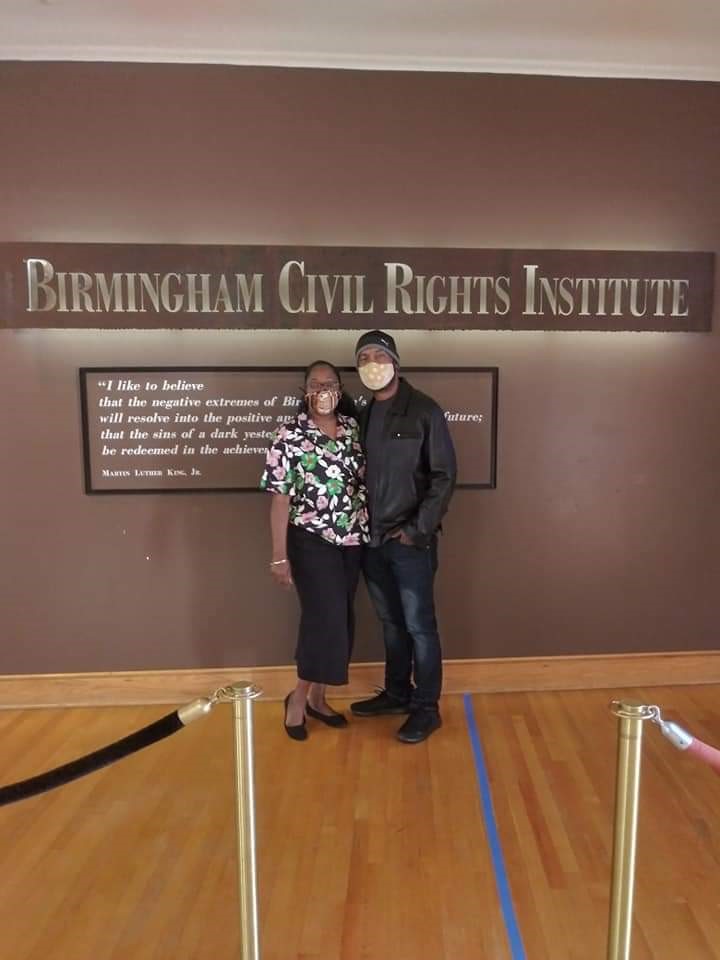
Emanuel reassured his wife and then 6-year-old son, Kareem, that his symptoms would pass. But Maisha convinced him to see his primary care doctor through a telemedicine appointment.
He was prescribed penicillin for bronchitis, but the stubborn cough persisted. By March 2020, Emanuel started experiencing lower back pain that kept him up at night, wheezing and trouble breathing. His family feared he could have COVID.
After a trip to urgent care, X-rays revealed fluid in his lungs. The family headed to the nearest hospital in St. Petersburg, where doctors used a catheter to perform a liquid biopsy and remove 2 liters of fluid from his lungs.
Emanuel was diagnosed with stage 4 lung cancer and urged to start chemotherapy the following day.
Where’s Daddy?
Maisha’s family flew in from Atlanta and Emanuel’s family drove up from Sarasota to help with Kareem. It was difficult for their son to understand why his dad was not coming home.
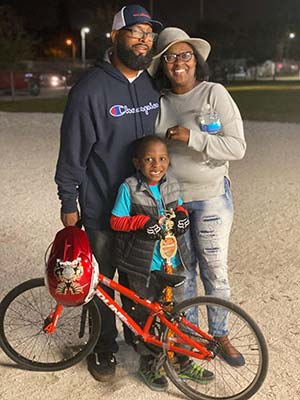
Kareem is a BMX competitor. His dad is his coach.
“My experience from working at Moffitt and my own knowledge as a Ph.D. kicked in,” Maisha said. “I wanted other options for my husband.”
Maisha’s uncle is a medical doctor and encouraged the family to seek a second opinion. She sought out Moffitt’s Dr. Jhanelle Gray, chair of the Department of Thoracic Oncology.
A few days before Emanuel’s 48th birthday, Gray confirmed the stage 4 lung cancer diagnosis. It had spread to his bones, liver and spine.
“When I initially got the news, I was devastated, but I didn’t share the news because I was trying to be strong for my wife. I was just stunned. I never questioned why it happened or questioned God. I kept asking, am I going to die? Am I not going to be here for my wife? Am I not going to be here for my son? I chose to call my spiritual leader,” recalled Emanuel.

Emanuel and his wife, Maisha.
Known for being a man of strong character and integrity, he now found himself distraught, disconnected and hopeless — facing the possibility of not having a future with his beloved wife and son. He was on disability. The weight of his diagnosis and the pressure of not being able to adequately provide for his family were unbearable. His marriage suffered from lack of intimacy caused by the disease, which caused him to free fall to a place he had never been to.
“Do you know how it feels to be sick for eight months? I didn’t know you could be sick every day. I couldn’t fathom it. You get the news you have cancer during a global pandemic. What a year, 2020. I went through some dark days. I was so depressed, spiraling and thinking about ending it all. My wife didn’t even know. I went through these emotions for about four months. It was a real battle,” said Emanuel.
But then hope appeared at his bedside.
‘I Want to Live!’
“It was a Thursday evening. There was a district church meeting I decided to attend virtually,” Emanuel recalled. “My spiritual leader preached a message on mustard seed faith and I immediately leaped out of the bed and said, ‘I want to live!’ ”
That night changed his life.
“Every day I press to get out of bed, I press to drive Kareem to school. I press out anxiety and I press towards the mark, like Paul did in the bible,” Emanuel said.
Emanuel had one round of radiation in September. Gray wanted to start with the targeted medicines first. Emanuel takes one pill a day of Lorbrena, a medication for people living with anaplastic lymphoma kinase (ALK+). He was also tested for genetic mutations.
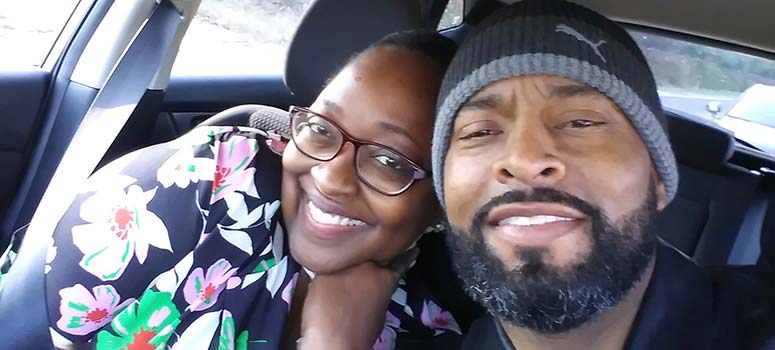
Emanuel and Maisha have enjoyed ten years of marriage.
He joined Facebook to share his message and has received responses from all over the world thanking him for his encouraging words.
“I wouldn’t change this experience, this is my cross to carry,” Emanuel said.
He also credits his wife for getting him through the tough times.
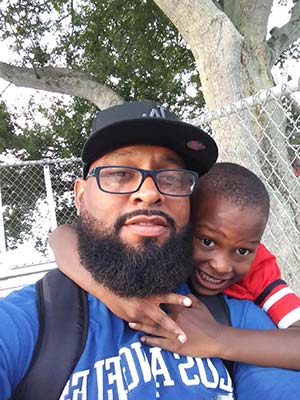
Holding on for life!
“When I went to hell, she came there with me,” Emanuel said. “Cancer is hell. My wife has given it her all. She is up at night studying and researching my disease, and she schedules all of my appointments.”
Emanuel presses on every day for his biggest inspiration, Kareem. He is reborn again through his faith. A renewed hope.
“Cancer tells you to stay in bed. It tells you not to move or eat, but I have this now 7-year-old looking at me who tells me otherwise.
I am simply my son’s superhero.”


